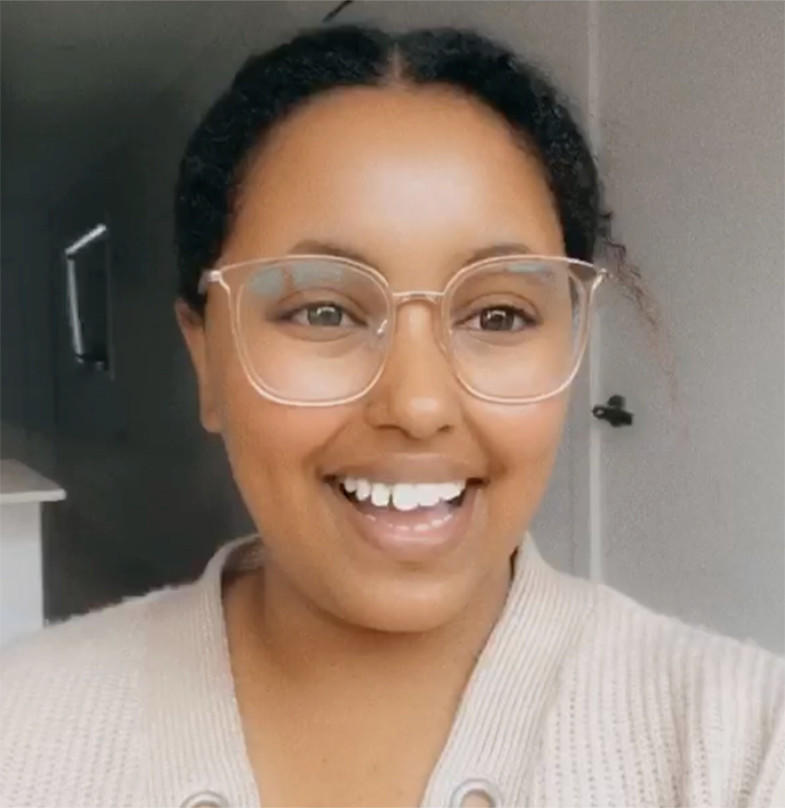How to Sing With Courage and Confidence in Front of People - in Just 9 Weeks - Without Risking Embarrassment or Being Afraid of What People are Going to Say
Are you a beginner singer?
Do you like to sing but just can't get your voice to sound good?
Don't know what you're doing wrong or how to fix it?
Do you only sing when you're alone or in the shower?
Would you like to have the courage and confidence to sing in front of other people one day?
Have you been...
- Trying a bunch of random vocal exercises and not really getting the results you want?
- Watching YouTube videos but only got more confused by different coaches saying different things?
- Trying to learn singing on your own but just not getting anywhere?
- Singing without any vocal training and getting sore quickly/losing your voice from time to time?
- Trying different singing courses but still not gaining confidence in your voice?
- Working on your singing skills but have performance anxiety/self consciousness that affects your voice?
You’ve probably tried to learn singing before, whether on your own or with from a coach.
If you didn’t get anywhere with it, it’s not your fault. There’s so much information out there - some good, some not so much. It can get confusing and overwhelming.
If you ever think you’re not talented enough to be a good singer, I’m going to show you how to change the way you think about that.
Our voice is deeply connected to our psyche. When we’re happy or angry, it shows up in our voice without us having to do anything.
So, when people criticize our singing voice, we feel like there’s something wrong with us as a person.
Singing is a very abstract activity. Your voice is inside your body, you can’t see or touch it.
So, it’s very hard for you to learn to control it. I mean, imagine learning to play the piano in the dark… while standing 5 feet away from it.
If you ever wanted to sing with confidence in front of people - it doesn’t matter whether you’re doing this as a hobby for yourself or you want to be a professional singer in the future - there’s a way to make it happen...
If you're a beginner/intermediate singer (doesn't matter whether you've had vocal training before)...
And you'd like to become a confident singer...
This is for you...
Having good vocal technique won't make you a confident singer unless you also work on your 'inner game'...
A balance of art and science is the secret that will help you sing with confidence once and for all...
To sing with confidence in front of people, you need to work on 2 things:
- Fundamental vocal techniques
- Inner game of singing
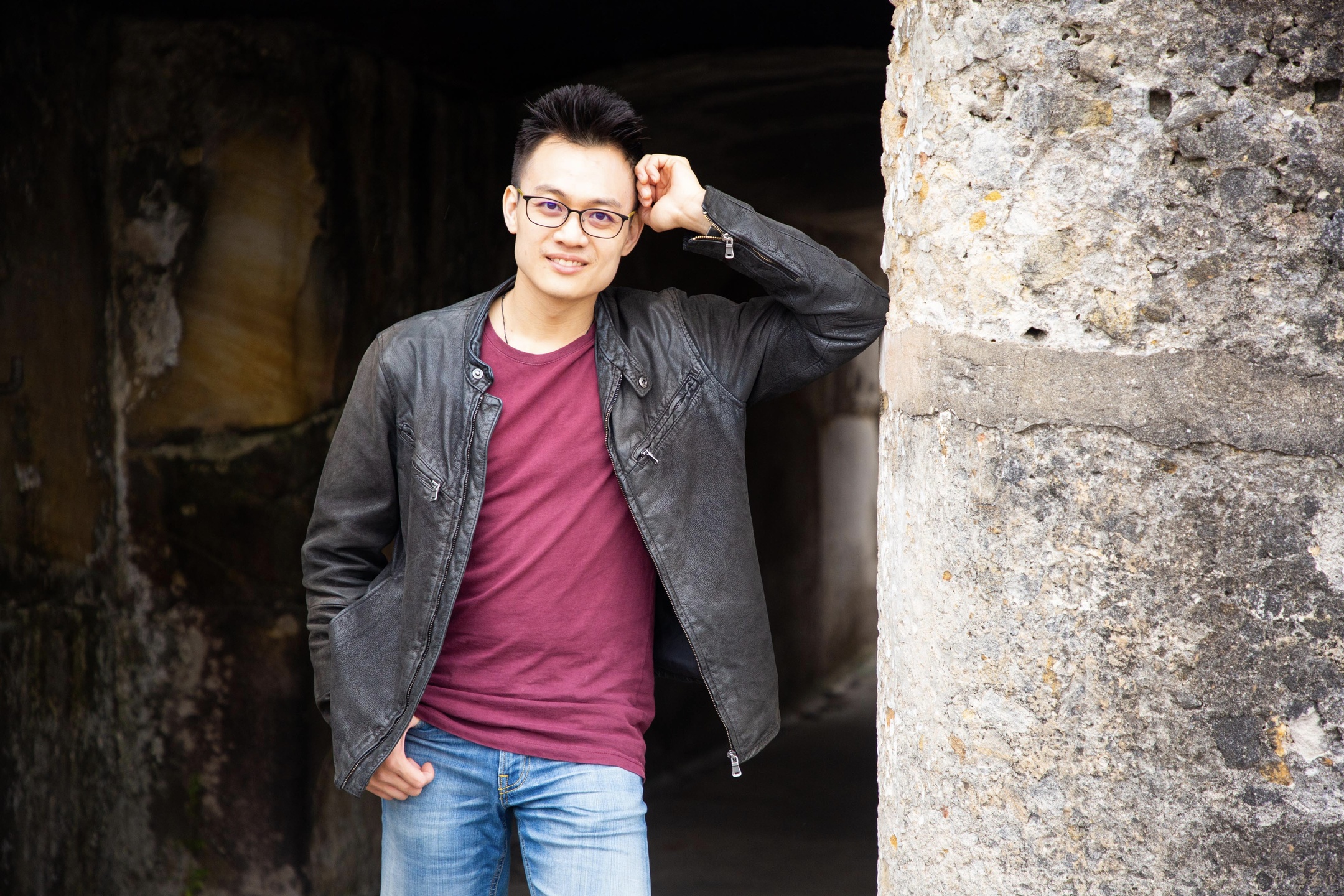
I'm going to tell you how you can learn to do those things, but first... let me introduce myself.
Hi! I'm Benny Ng from TopSingingSecrets.com.
I'm a rock singer, songwriter and I've released music under my artist name, Shadowary.
I've been teaching singing lessons since 2011. I have 4 university degrees in music (two of those were postgraduate degrees). I graduated from the renowned Sydney Conservatorium of Music with a Grad Dip in Vocal Pedagogy (for teaching singing).
But it wasn't always like this...
The hall was dark, save the spotlights shining down onto the stage.
Standing in front of the microphone, I sang "Imagine" (by John Lennon) with a shaky voice.
As my accompanist played the chords on the grand piano, I fumbled through the song - going out of tune here and there.
I felt like crawling into a hole and hide.
My throat felt like it was running on fumes while I finished the song with one final high note.
Scattered applause came from the audience as I mumbled "thank you" before running off the stage.
If you hadn't guessed it, that was a scene from my graduation recital night at the first university I went to. I almost failed that final performance exam.
I'd always had this urge to be creative and express my emotions through performing arts. I felt like singing and writing songs were my calling in life.
I wanted to be a professional rock musician.
I moved to Australia to study a Bachelor of Music (Performance) course. Born and raised in Malaysia, I didn't get much vocal or music training.
So, the learning curve was steep. Imagine going from primary school to university. That was how I felt.
Culture shock and pressures of life made it difficult for me to focus on my studies.
I had a great singing teacher but he moved to another state halfway through my course.
Singing didn't come naturally to me. I'd overthink things and my throat would get sore very often. I felt lost and confused.
Our voice is inside of our body. We can't see or touch it.
How was I supposed to learn to play something I couldn't see or touch?
This was like learning to play the piano in the dark... while standing 5 feet away from it!
For the next 2 years, I fumbled through the course and barely passed my final performance exam.
Instead of feeling joy and pride, I felt like I had hit rock bottom. That wasn't what graduating from a university should feel like.

But I wasn't going to give up.
I decided to take things into my own hands. I wanted to learn everything I could about the science and art of singing.
I enrolled in a postgraduate course at the Sydney Conservatorium of Music.
It was there that I discovered the holy grail of singing.
It was an underlying concept that made all vocal techniques worked.
In fact, this concept has been around for over a millennium (1000 years).
It came from Classical singing (operatic singing) but can be adapted to all contemporary/modern music genres.
This concept is called the Open Throat Concept.
It makes singing easier by helping us create more space in our throat and mouth, so we can make more sound with less effort.
To make our voice like a guitar, and not a ukulele.
And it made sense because our voice works like other acoustic instruments (e.g. recorder, trumpet, guitar, flute).
When there's more resonating space in the instrument (bigger body), you'll get a bigger/rounder sound with more projection.
A guitar is louder than a ukulele because a guitar has a bigger body.
MORE SPACE = MORE RESONANCE = MORE PROJECTION
I spent countless hours in the library, poring over textbooks and research journal articles.
I wanted to learn all I could about how the voice worked.
I bought or borrowed every single textbook that was recommended by my lecturers.
And I studied them all.
Then, I went into the practice studio to try out the things I learnt.
I was shocked by how quickly I improved.

I could now sing higher than I ever did before.
I was singing in tune most of the time. And singing felt a lot easier.
I was one step closer to fulfilling my dream of becoming a rock singer.
I started to learn how to belt and do metal screaming... but the mechanics of those advanced techniques were so different.
Somehow, the open throat concept techniques didn't work as well as before.
My throat hurt after belting and screaming.
I went and did more research. I even took screaming lessons that cost $300/hour.
I discovered I actually had low level performance anxiety. Deep down, I was afraid of people judging my singing.
I'd feel insecure whenever I made mistakes while singing. I was afraid of what people might say about my voice.
This self consciousness affected me more than I knew.
Using psychology and meditation strategies, I managed to overcome my performance anxiety.
I can now belt a high G5 when I sing. I now have a 3-octave vocal range. Metal screams come easily to me.
When I perform rock songs, I feel more authentic because I'm in the moment. There's a sense of freedom when I'm channeling my emotions through my voice.
I even started doing live online music shows for my fans.
After 'finding' my voice, I feel more confident as a person.
I'm more motivated than ever to achieve my goal of becoming a professional rock musician.
Singing is now a source of pride and joy that I'll cherish for the rest of my life.
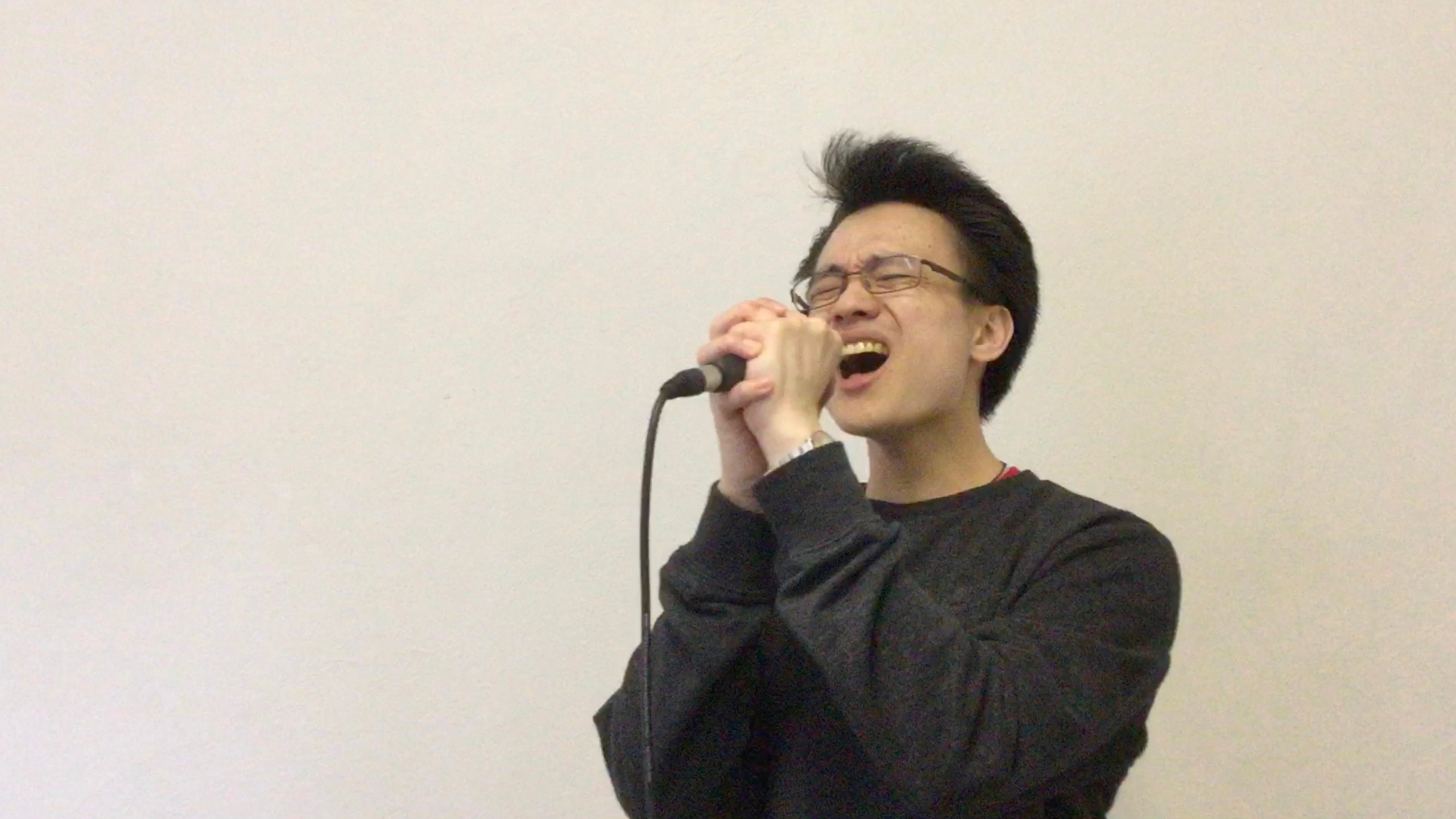
Now, you may not want to be a professional musician... you may just want to get good at singing for your own enjoyment.
Having an open throat will still help you be the best singer you can be. This is the foundation on which all your vocal techniques will be built.
The great thing about it is you can adapt it to any genre you want to sing in (whether it’s pop, rock, musical theatre, jazz or metal).
Traditionally, when you take singing lessons, you’ll learn a bunch of techniques without really understanding why you’re doing them or how they work. You get thrown a bunch of vague imageries to make those techniques work.
That’s hard because singing is so abstract. You can’t see or touch your voice. If there’s no structure to how you learn your techniques, you’re going to be confused.
The open throat concept groups everything into one place.
And if you have an intellectual understanding of how the vocal techniques work… do awareness exercises to build the muscle memory for those techniques…then trigger the muscle memory using intention/imageries when you’re singing…
You can make sense of what you’re doing… and singing will feel natural to you.
And when you can trust your voice to make the sounds that you want it to make… by just thinking about it (instead of trying to ‘control’ your voice)… you’ll sing with more confidence.
The best way for you to sing with confidence in front of people is by mastering the open throat concept, and applying the techniques to your singing using intention
This has also worked for all the private students I teach.
This is Hayley getting to the top of her range using a technique from the open throat concept.
But first... can you really learn to sing on your own?
A lot of what I know about singing was self taught.
I learnt from books and videos. I learnt from practicing the techniques and from making lots of mistakes along the way.
Singing is all about trial and error. I wasn’t afraid to make bad sounds or sing out of tune when I was practicing.
I figured if I could make all the mistakes I could make and learn from them, then my performances would be perfect.
When learning from a vocal coach, I’d feel anxious if they were someone I didn’t have a rapport with. Also, I was someone who had a lot of questions. I felt bad asking that many questions.
I felt like I could find the answers I needed through research and just experimenting with the things I learnt.
I’d also do a lot of self analysis by recording my own singing and playing them back immediately.
Sometimes, I’d spend hours in front of the mirror to check if I was doing the techniques right.
Sure, I probably would’ve made quicker progress if I had more guidance from a coach. But I wouldn’t have done it any other way.
Doing my own research and practicing on my own gave me confidence because I knew my foundation was strong and I had control of my own learning.
Here's what Carlene said after learning a vocal technique from a video I put up

Are you thinking these things?
You’re probably thinking it’s hard to learn singing from videos…
Well, that was how I finally understood how to do metal screaming the right way…
And it’s not just for screaming… it actually works better for ‘normal’ singing styles.
You’re probably thinking you’re a total beginner and you need someone to hold your hand and guide you through the techniques…
Well, by watching the videos over and over, and analyzing your technique using a mirror and audio recorder, you can still make good progress… you’re going to build a much solid foundation - having to correct your own mistakes.
You’re probably thinking it’s hard to do it all yourself…
Well, there are ways to keep yourself accountable and motivated without actually having to spend a lot effort… what if you get weekly group coaching sessions to get feedback and keep you accountable?
You’re probably thinking you wouldn’t know where to start or what to do next…
Well, what if I told you there’s a structured curriculum, and all you need to do is to do the lessons in the order I show you?
How to learn to sing well on your own without making unnecessary mistakes and picking up bad habits?
By being proactive and having an open mind...
When you have a course that shows you what you need to learn... and in the right order that you need to learn them...
And when you get weekly feedback and all the tools you need to make it happen...
You can learn singing on your own without picking up bad habits.
But do you really have the talent to sing well?
Singing didn’t come naturally to me. I always sang out of tune and felt my throat getting really tight when singing high notes.
I wanted to sing with freedom and good technique while expressing my emotions.
It wasn’t an easy journey because singing was so abstract.
Back when I was learning to sing, my teacher would record my singing for me to listen to when I got home... but I never listened to them.
Then, I started getting serious about singing. I found out I could learn to ‘play’ my voice just like any other instrument.
But unlike any other instrument, I couldn’t see or touch my voice.
I needed to learn to visualize and feel it. So, I did a lot of research - looking at different methods taught by different teachers.
Finally, I found out about the open throat concept.
After overcoming my performance anxiety (self consciousness), I now feel proud of my voice every time I sing.
And I’m closer to achieving my dream of becoming a professional musician.
Jess went from closet to stage

She was a total beginner.
She often had trouble singing in tune.
She enrolled in the Singing Confidence Academy and did all the lessons and eventually got better at singing.
She even performed a song in front of a small audience.
Are you going through these things too?
You’re probably thinking: "Oh but I really can’t sing…"
Well, I’ve been teaching singing lessons for over 11 years and I’ve never met anyone who couldn’t sing well.
Yes, some progressed more quickly than others, but every single one of my students had breakthroughs and they definitely got better at it.
You probably had a bad experience before when you sang in front of people… maybe someone told you you sounded awful… and you felt like they cut deep into your soul…
Well, I’ve heard this story from many of my students.
Our voice is deeply connected with our psyche and emotions. When people say bad things about our voice, we feel like they’re saying we’re a bad person.
Some people get affected by that so much that they’d stop singing from that moment on. It’s so sad because our voice is a part of our body. With the right guidance, you can train it to sound good.
But still… bad experiences can create self-limiting beliefs that are hard to correct.
What are self-limiting beliefs? They are beliefs about certain things… in this case, singing… that are not necessarily true. But because you believe in it, it becomes true for you.
To get what you want in life, your beliefs need to align with your goals. You need to reprogram your belief system if you have self-limiting beliefs.
And that's what the inner game of singing strategies do for you.
You probably have a lot of trouble singing in tune and you wonder if you could ever learn to sing in tune…
First of all, if you have tone deafness… which is a physical condition that can’t be cured… then it’d be very hard for you to sing in tune. The good news is that it’s a rare condition. The only way to know for sure is to see an audiologist.
I’ve actually worked with a student who was diagnosed as tone deaf. He had to work really hard to sing in tune… but when he practiced a song long enough, he could still sing in tune.
Because most of the time, the reason why you sing out of tune is because you’re not breathing correctly, not recognizing the pitches/notes you hear… or your larynx is not flexible enough.
All of those things can be trained… and you can get better at them… and when you do, you’ll sing in tune.
You’re probably thinking you’re too old to start learning to sing…
Well, I didn’t start learning to sing until I was 17.
I always read about famous singers starting at a young age.
But then I found out that a lot of opera singers would only be considered good enough to be a professional when they’ve trained until their mid-thirties.
Our voice is like the rest of our body. The more we train it, the stronger it gets, the better it sounds.
And there are many famous singers who are still performing in their sixties and seventies.
I thought to myself: "Even if it took me 20 years to get good at singing, I’d still just be 37 years old. I’d still have time to perform with a voice I could be proud of."
I decided I’d be the best singer I could be, and not compare myself to any other singers.
If I could express my emotions in an authentic way, through the music I wrote, then I’d be a happy man.
And that’s what I’ve been doing since 2019. I released original music under the name of Shadowary. I post singing videos on Instagram all the time and I do live online music shows.
You’re probably someone who’s a perfectionist and you’re afraid of making mistakes…
Well, although I was someone who felt comfortable being on stage, I’d feel insecure when people criticized my singing voice.
It made me feel like there was something wrong with me as a person. I knew that wasn’t logical but I couldn’t help but feel that way.
This self consciousness was always under the surface. It made me hold my voice back from achieving its full potential.
It made me afraid of making mistakes.
I knew I had to overcome that if I were to become a professional musician.
I eventually learnt strategies from psychology to deal with my performance anxiety.
I reprogrammed my mind and embraced the trial-and-error that came with singing. I can now sing with freedom and expressiveness without being self conscious.
You’re probably thinking your voice is too soft to sound good…
Well, my voice is naturally soft because my vocal folds are thinner (because I’m a high voice).
I’d always struggle to speak loudly. I remember when I was a high school classroom teacher, students often had trouble hearing me because my voice lacked projection.
If I wanted to be a rock singer, I knew I needed to add volume to my voice without straining it.
It’d also make me feel more confident.
So, I learnt to belt.
It was hard at first because I was so self conscious. It made me hold back.
I eventually overcame my anxiety and learnt to trust my voice.
I can now speak and sing louder by controlling different parts of my mouth and throat.
You probably think your voice is too loud and it’s hard to control…
Well, a lot of my low-voiced students have trouble controlling the volume of their voice. They have a naturally big voice.
Those students would usually push with their breath really hard while tensing up their throat.
For them, singing felt like a hardcore workout.
When I showed them how to sing lightly and make more space in their throat and mouth, they got better at controlling their voice volume.
It usually took about 6 weeks of singing lightly (or with a soft volume) for them to get a grip of the techniques.
After that, I’d show them how to blend their chest voice back in. When that happened, their voice would sound more balanced.
So how do you know if you have the talent to sing well?
If you can speak and sing without your voice hurting or sounding really hoarse (like there’s no sound coming out), and you have the desire to sing (even if you feel anxious about it), you have the talent to sing well.
How to overcome performance anxiety, be at one with your voice and finally sing with confidence?
Although I was someone who felt comfortable being on stage, I’d feel insecure when people criticized my singing voice.
It made me feel like there was something wrong with me as a person. I knew it wasn’t logical but I couldn’t help the way I felt.
This self consciousness was always under the surface. It made me hold my voice back from achieving its full potential.
I knew I had to overcome it if I were to become a professional musician.
I reprogrammed my belief system and could now sing with authentic emotions without being self conscious.
How Elise got brave enough to sing at a birthday party...
Elise had a high and beautiful voice… but she was really shy to sing in front of people…
She thought she wasn’t good enough so she sang very softly.
I helped her to reprogram her self-limiting beliefs by doing positive affirmations, visualization and other strategies to bring her out of her shell.
She got so much more confident and even sang at her friend’s birthday party.
How Eddie finally took the leap...
Eddie was really self conscious about his singing… he was really scared of making mistakes… he was a perfectionist.
We’d do online lessons and he’d wait until nobody’s home or he’d do the lessons in his car so no one could hear him.
But he’s determined to overcome his fear… Christmas was coming up so I suggested he prepared a song to perform in front of his family.
We went through inner game strategies for singing to get him mentally and emotionally ready for his performance.
On Christmas Day, he performed for his family at his family lounge room and everyone was really proud of him.
Are these things happening to you?
You’re probably thinking your anxiety is much more serious and no one can help you…
Well, I used to train in Brazilian Jiujitsu.
I was the smallest guy at the school and I’d always get beaten up.
Before class, I’d think of the worst things that could happen.
I’d freeze and hold my breath when sparring… I’d feel like my life was in danger.
One day, my coach said in front of the whole class: “Benny! You’re like a deer in headlights!”
I subconsciously knew I was doing that but I wasn’t aware of it until he called me out.
Since then, I’d catch myself freezing and holding my breath, and I’d say to myself: “Move, breathe… move, breathe.”
I started to enjoy training more and more… a few months later, I was promoted to blue belt.
What I’m trying to say is that there are 4 kinds of performance anxiety and even the worst one can be overcome… I’ve seen it happen before to students of different ages and I know you can do it too by improving your inner game.
Maybe your family members or friends are not supportive of your singing… maybe they make fun of you for trying.. or they always try to put you down….
Well, I’m lucky my family is supportive of my singing.
But since moving to Australia, and far from my family, my support network was now gone.
But I kept up the practice…
Eventually, I found a supportive network of fans on Instagram. I posted videos of me singing and got positive feedback… and it felt good.
It shows that you can find your support network if you look hard enough.
Maybe you don’t have a space to practice in private…
Well, I used to live in a tiny city apartment. The walls were thin and sound traveled easily.
So, I had to practice in the bathroom and laundry room. The dryer was literally right in front of my face.
It wasn’t ideal but at least I still got to practice. It forced me to get used to practicing in different spaces and getting used to the acoustics of different spaces.
I remember seeing a behind the scene footage of Ariana Grande warming up her voice in a crowded hallway while waiting to get on stage.
She was holding her iPhone to her ear and singing along to the exercise tracks playing on the phone.
Any practice is better than no practice at all… I made the best of what little space I had.
Later on, I moved out of that apartment and now have a dedicated practice space.
Or maybe you’re thinking singing lessons/courses are too expensive…
Well, I used to take lessons on how to do metal screaming with a coach named Melissa Cross… she was based in New York.
It cost me $300/hour.
I was still a university student back then and didn’t have stable income…
But I really wanted to learn how to scream properly so I didn’t hurt my voice.
I asked to pay for my lessons by instalments and she agreed.
I was glad I didn’t delay my lessons because it would've taken me so much longer to get better at it.
You’re probably thinking you don’t have the time to learn singing or to practice…
Well, if you really want something, then you have to make time for it.
We make time for the things that are important to us.
I get it… sometimes our lives can get so busy, we barely have time for ourselves.
But let me ask you this: can you set aside 15 minutes, 2 days a week to learn/practice singing? How about 10 minutes? 5 minutes?
It may not sound like much but it’s enough to keep you moving forward… to keep getting better.
It beats standing still/procrastination anytime.
I used to be a primary school teacher… I had to travel an hour and a half to get to the school… and I’d do my vocal warm-ups in the car.
What to do if you're really nervous/shy/scared to sing in front of people?
If you have performance anxiety, I want you to know that you can’t control it but you can manage it.
There are many inner game strategies like reprogramming and habituation you can use to boost your confidence.
You’ll get to a point where performance anxiety actually helps you to sing better.
Let me ask you a question...
If you knew how to learn singing on your own effectively, and you had the talent to sing well, and you did the inner game strategies I mentioned to boost your courage and confidence… would you think you could be a confident singer?
Are you excited about what I just told you?
Are you feeling a little overwhelmed because we covered so much?
Introducing:
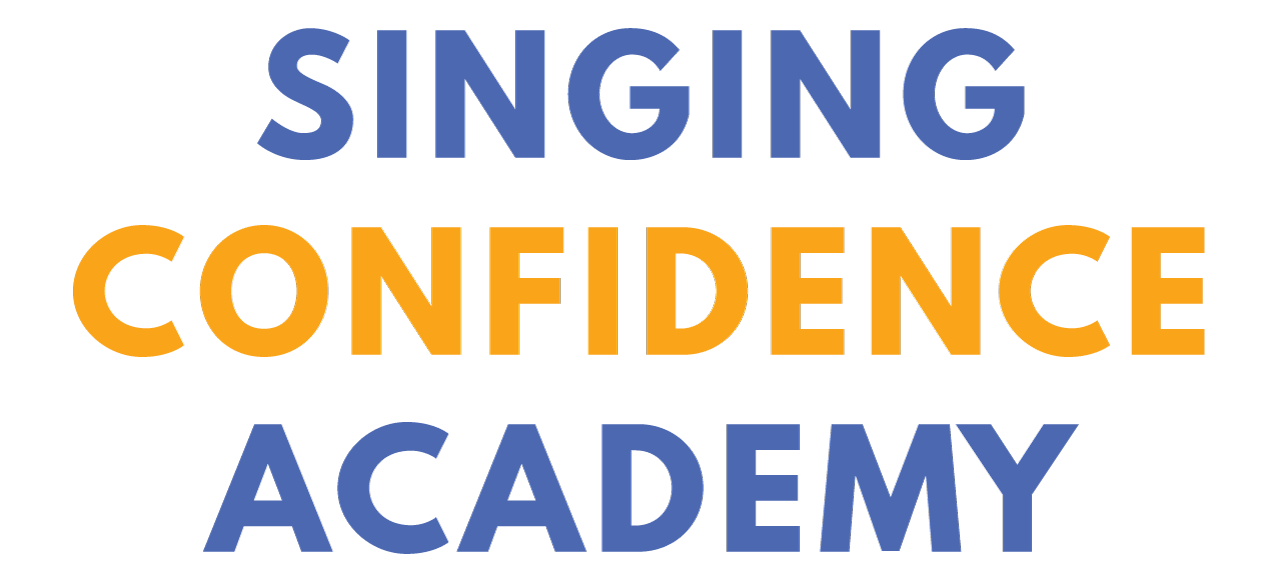
Go From Closet to Stage:
A Comprehensive Program to Gain Vocal Skills and the Confidence to Sing in Front of People - Faster Than You Think - Without Risking Embarrassment or Spending $$ on Private Lessons
(This Works Even If You Only Sing in the Shower and You Don't Like How You Sound)
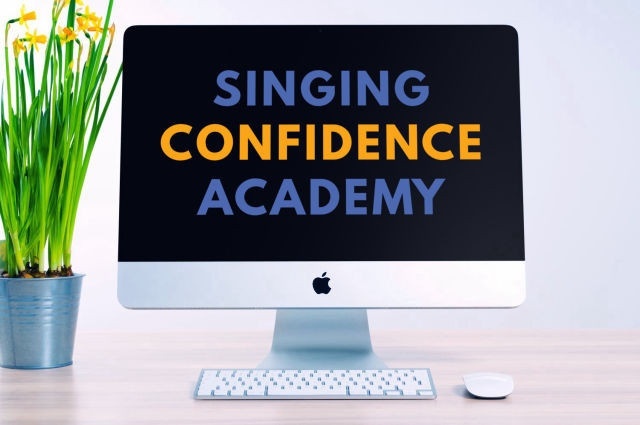
In Week 1-6, we’ll cover the complete open throat concept, complete breathing technique for singing and the complete song learning method.
In Week 7, we’ll talk about how to keep your motivation high.
In Week 8, we’ll talk about the power of intention, and how to use it to make singing look and feel natural.
In Week 9, we’ll get you ready for your first public performance.
In Week 10-12, you'll learn how to take care of your vocal health and start to blend your voice.
Rachel had an intense fear of singing...
Her legs would be shaking non stop and she’d feel like running off stage in the middle of a performance.
When we started doing private lessons, she wouldn’t even sing in front of me much.
I took her through the open throat concept so she’d have a strong foundation.
Then, I showed her strategies to reprogram her belief system and to boost her confidence.
When she performed at our end of year student showcase, her mom was so proud of her that she cried!
Jason was trying too hard...
Jason had a fair bit of performance experience…
For some reason, he just felt like he was trying too hard when he was singing.
He wanted to make singing feel easy and natural… so he could belt high notes easily.
He had a perfectionist mindset… that means he was afraid to fail…
Once he was aware of that, and really be ok with making mistakes… he started to improve really quickly… because he was using his intention and not his thinking mind…
Now, he can get through a show and still have a voice the next day.
Who is this academy for?
This academy is for you if you’re a beginner or intermediate singer… (you don't need any previous training or experience)… it’ll help you get ready to sing in front of people for the very first time…
Even if you never want to do that, this academy can help you be the best singer you can be… as long as you have the desire to be a better singer…
When we sing in front of an audience, every one of us will get performance anxiety… learning to manage that can really make you stand out.
It’ll work for you as long as you can speak/sing without your voice hurting a lot or sounding too hoarse (like there’s no sound coming out).
If you’re on the fence because you’re still not sure if you have the talent to sing well
Let me tell you that I’ve been teaching since 2011, and I’ve never met a student who couldn’t improve their voice… NEVER… not even that one student who was actually tone deaf…
Without meeting you, I’m going to say there’s a 99% chance you have what it takes to be a better singer.
What Enrolled Students Say
"The singing techniques are very informative and fun to do… it’s really exciting when you see the progress you’ve made over the course from when you started…" - Jess Saxton





What Industry Experts Say
Kristy James (Shape Music)
Award-winning singer/songwriter/singing teacher/music industry coach
Kristy Audsley
Professional singer
What You'll Get
Singing Confidence Academy Core Lessons x 12 + Booster Modules ($1997 Value)
Lesson 1: Awaken the Confident Singer in You
Lesson 2: Sing Higher Than Before by Having Big Mouth Space + Learn Songs the Correct Way So You Don’t Waste Time
Lesson 3: Shape Your Vocal Tract to Release Tension and Make Songs Easy to Sing
Lesson 4: Double Your Projection and Increase Your Range Even More
Lesson 5: Sing Powerful High Notes Freely (Without Voice Cracking) By Controlling a Part of Your Throat Most People Don’t Know About
Lesson 6: Make Open Throat Concept Techniques a Natural Part of Your Voice
Lesson 7: Use Goal-Setting and Successful Vocal Practice Habits to Keep Your Motivation Sky-High
Lesson 8: Use the Power of Intention to Be at One With Your Voice
Lesson 9: Getting Ready For Your Debut Performance
Lesson 10: Blending - How to Make Your Voice Sound Strong and Balanced Throughout Your Entire Range (Part 1)
Lesson 11: Voice Care - Looking After Your Voice, Avoid Vocal Damage and Be Vocally Fit For Life
Lesson 12: Blending - How to Make Your Voice Sound Strong and Balanced Throughout Your Entire Range (Part 2)
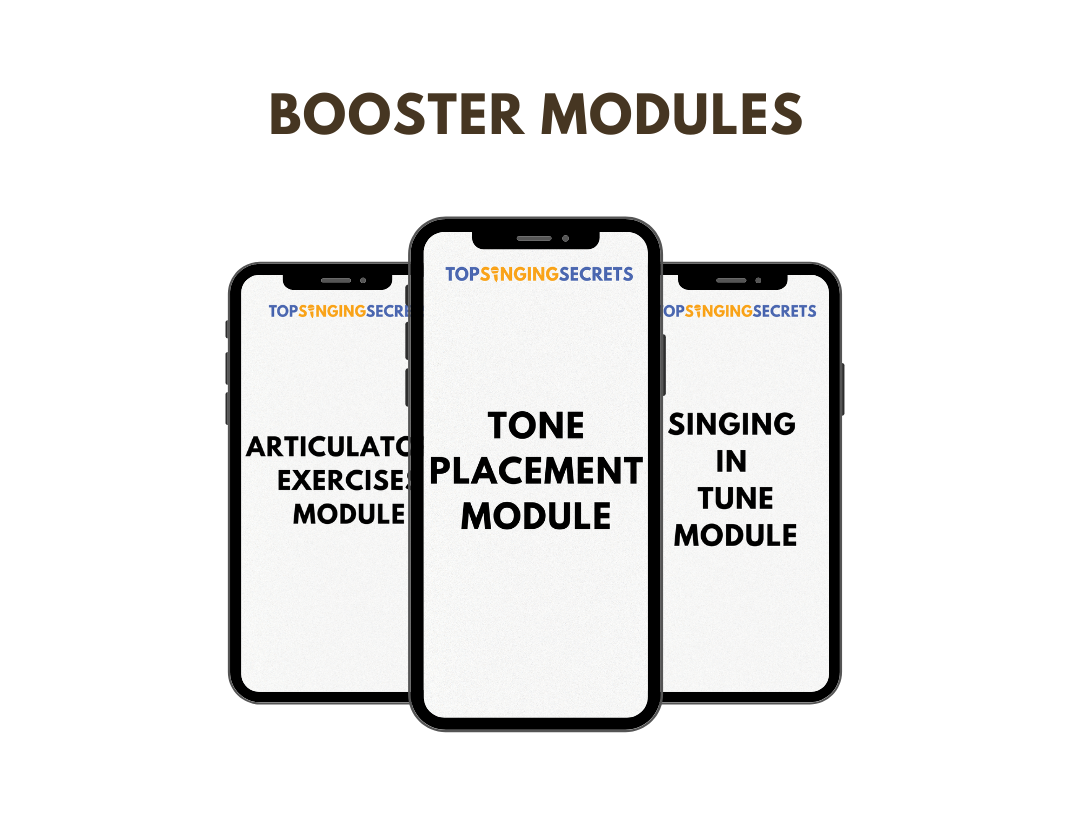
Booster Modules: Effective Techniques and Exercises to Boost Your Singing to the Next Level
- Tone Placement Module
- How and where to place your voice to get maximum projection
- Simple techniques for singing in a full tone and in falsetto
- Articulators Exercises Module
- Neck & jaw massage to release tension
- Lips, tongue, jaw exercises to make your mouth more agile
- Sing with clear pronunciation and excellent phrasing (like Adele & Frank Sinatra)
- Singing in Tune Module
- Why you sing out of tune
- How to sing in tune
- Ear training exercises
Vocal Practice Package ($199 Value)
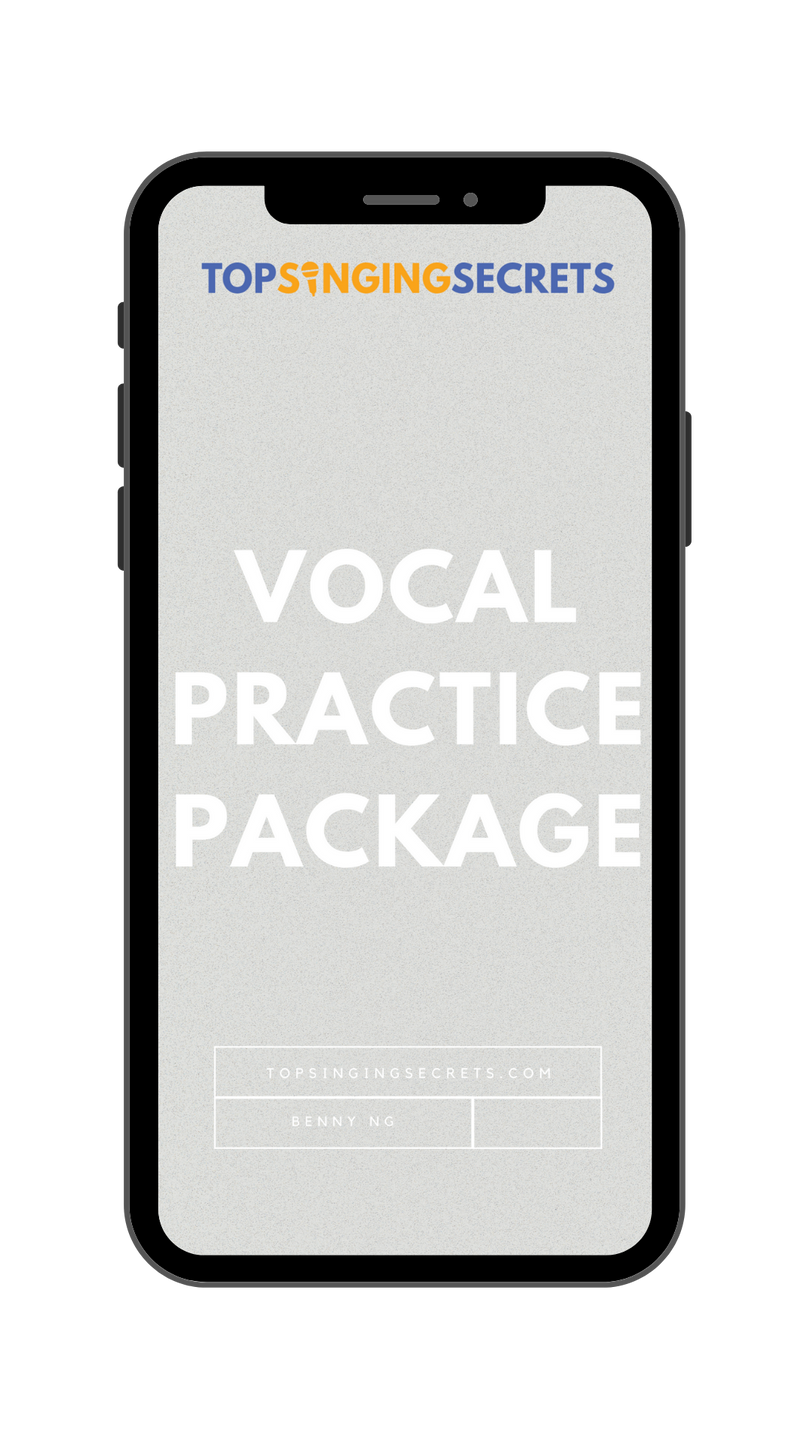
Vocal Practice Package: a Toolkit For Successful Vocal Practice and Guaranteed Progress
- Vocal Warm-Up & Exercise Tracks
- Vocal Warm-Up Session Planner
You'll know exactly what exercise tracks to use to get better at singing. No longer be confused or overwhelmed.
I use these exact same exercises to warm up and train my voice everyday. This will save you so much time by not having to figure it out yourself... or doing the wrong ones and potentially hurting your voice.
You can either download them or stream them online. I'll show you how to do the exercises at the beginning of each track.
Live Zoom Group Coaching Sessions x 6 ($997 Value)

Live Group Coaching Sessions: Live & Direct Access to Benny Ng For Instant Feedback, Quick Progress and Peace of Mind
- 6 x 1-Hour Zoom Live Group Coaching Sessions
- You'll get an exclusive Zoom meeting link
- Go through techniques you don’t understand
- Ask questions
- Get instant feedback
- Connect with other like-minded singers
I had to go through a lot of trial and error to gain control of my voice.
You'd need to go through the same process too, but I can make it easier for you by giving you real-time feedback every week.
This will shave months, if not years off your learning time.
I've been teaching online singing lessons for years and I know they work. I've found ways to adapt to not being in the same room.
You'll still get great results because if you set up your equipment like I tell you to, I'll be able to see and hear you very well.
And you don't even need any fancy equipment. Just a computer/tablet/phone and stable internet connection will do.
Even though these are group lessons, you'll get time for individual feedback (if you like).
Inner Game of Singing ($497 Value)
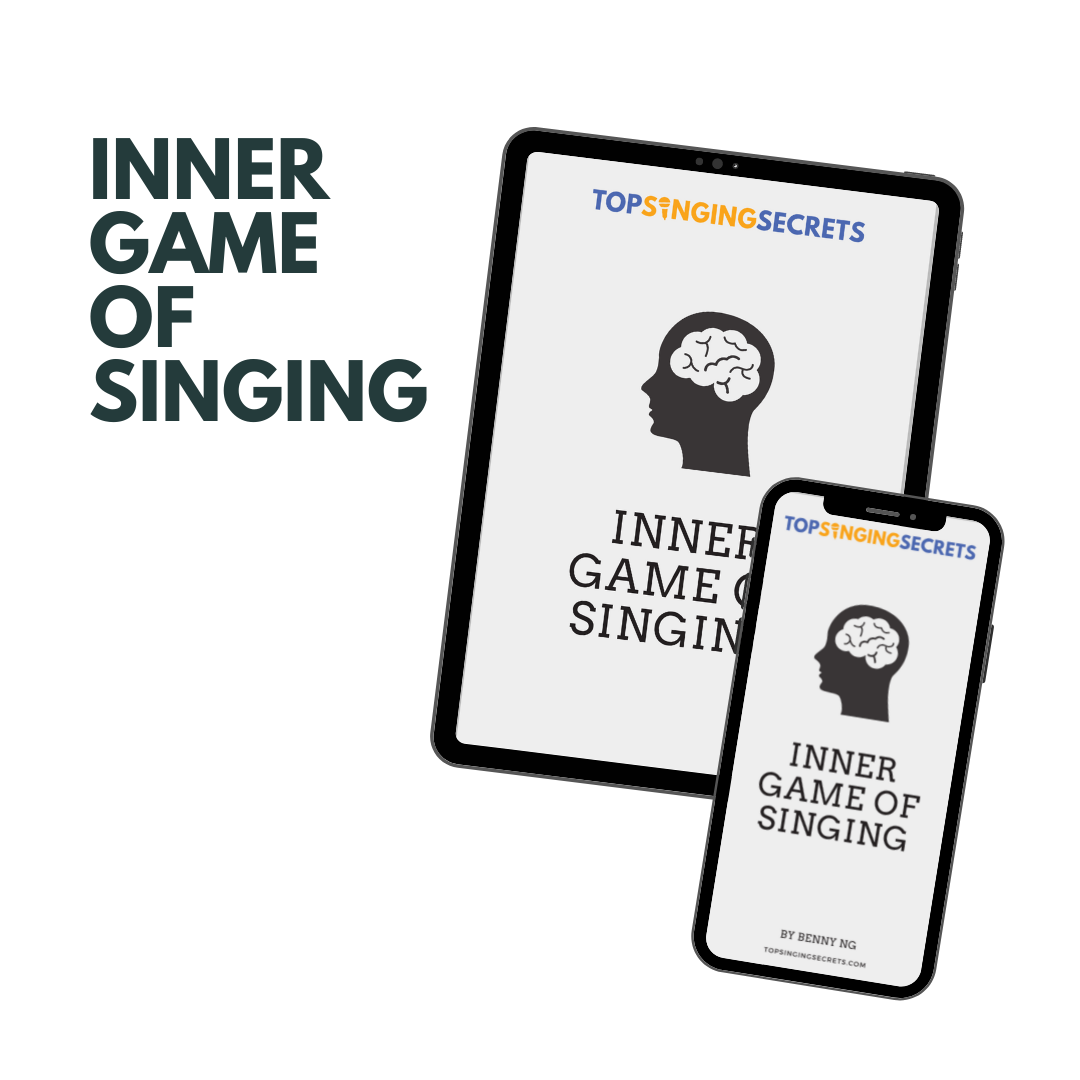
Inner Game of Singing: the Closet Singer’s Guide to Singing Confidence - Break Your Self-Limiting Beliefs and Reach Your Full Vocal Potential
Your voice can be trained, just like the rest of your body can be trained for different movements/sports if you put in the effort. But your self-limiting beliefs may be holding you back. Learn to build a confident mindset and achieve your full vocal potential.
- Overcoming Performance Anxiety Module
- Why you feel anxious about singing
- Field-tested anxiety management strategies
- "Confidence Booster" for instant confidence
- Positive Affirmations Worksheet
- Visualization Scenarios and Guide
- Confidence Booster (Audio Only Version)
I spent months researching about this. I studied books and videos from different subjects such as psychology, meditation and ESP.
Then, I adapted them to singing.
I tried the strategies on my private students and tweaked them for the best results.
Now, you'll benefit from it too.
Never underestimate the power and importance of the inner game of singing. It'll take your singing to a whole new level.
Motivation Secrets ($297 Value)

Motivation Secrets to Keep You on Track to Achieving Your Singing Goals
- Practice plans to keep you accountable
- Practice spots ideas
- The secret statement (proven by research) to make sure you stick to the plan
- How to take breaks and rest without feeling guilty about it
Being a mainly self taught singer and entrepreneur, I have to find ways to keep myself motivated.
I'll share with you my discoveries based on my personal and teaching experience; as well as from self improvement resources that have helped me.
Being motivated will feel easy and natural when you have the right strategies.
Lifetime Updates (Priceless!)
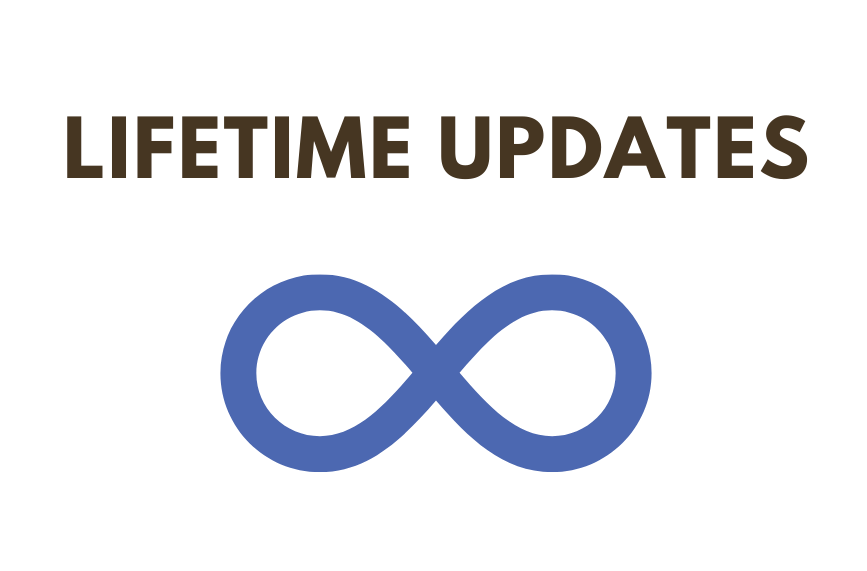
Lifetime Updates: Extra Content For Free - For Life
- You’ll be notified and get instant access when new content has been added to Singing Confidence Academy
Everything you'll get when you enrol...
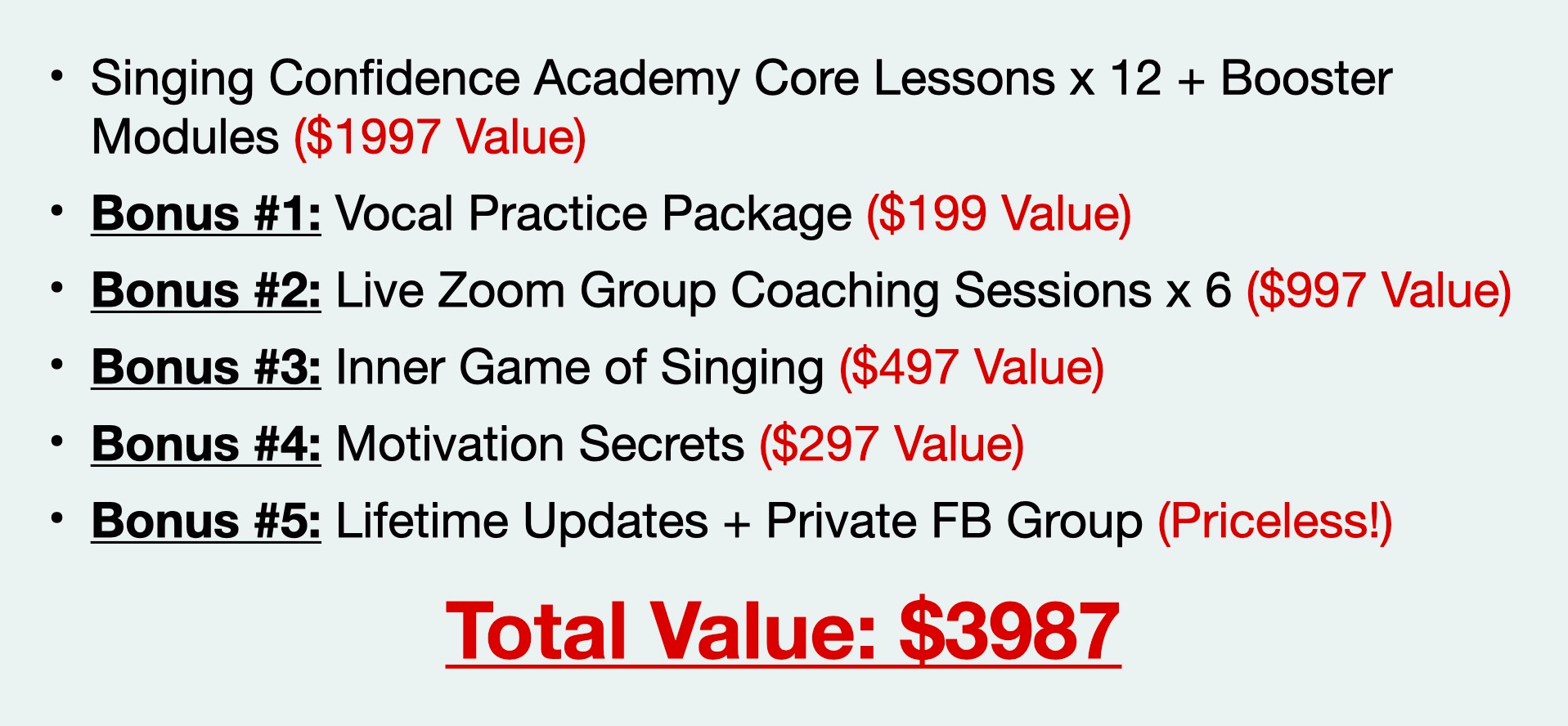
Obviously, I won’t be charging you $3987...
But if I did, and you get to finally sing like how you’ve always imagined, would it be worth it to you?
If all this academy did was to give you a way to learn singing without risking embarrassment/judgment, would it be worth $3987?
If all it did was to help you achieve your full vocal potential, would it be worth it?
If all it did was to make your performance anxiety go away so you have lots of courage to sing, would it be worth it?
I had 2 choices...
I could go as cheap as possible to sell as many as possible…
But if I did that, I wouldn’t be able to give you much value.
So I decided I’d need you to invest a little bit more.
That way, I can dedicate more time, energy and resources to help you get better at singing.
Imagine if your voice was perfect the way you wanted it to be and you were absolutely proud of your voice… what would it be worth to you?
How much would you pay to really have that freedom and confidence to sing your heart out anywhere, anytime?
The academy and the bonuses are worth $3987…
But because I really want to help you be a confident singer, I’m going to give you a special offer…
Your price to enrol is only USD 397
If you were to take private lessons...
If you were to get private lessons from a vocal coach, it’d cost you at least $60/hour. Lessons are usually done weekly to get the best results… and it’d probably take you months, if not years, to master the techniques…
Quick math: $60 x 4 weeks x 6 months = $1440
But because you’re learning to do this yourself, and I’m giving you all the tools and resources you need to make it happen, you only pay 397.
You've got 2 choices...
- You do nothing about what you’ve just learned, and what do you get? Nothing
- Or you make an investment in your singing voice and see how far it’ll take you

#Closet2Stage 14-Day 100% Money Back Guarantee
I want you to be 100% satisfied with the program.
If you’re not happy with Singing Confidence Academy, send me an email within 14 days of enrolment and I’ll give you a full refund.
I want to make it risk-free for you.
The real question is this...
Would it be worth checking out the academy to see if it’ll work for you? I mean, with the money back guarantee, there’s no risk for you…
And even if the academy does only half of what I told you… you’ll get your money’s worth as soon as you increase your range and gain more control of your voice… which usually happens by either Lesson 2 or 5…
FAQ
Can anyone learn to sing?
Can this program really work for me?
How long will the video lessons be up for?
How can I access the lessons?
Do you offer gift vouchers?
What equipment do I need to access the course?
How would I know if I'm doing the exercises correctly?
What if I don't feel ready for next week's lesson?
How much practice do I need to do?
I'm a busy person. Will this course work for me?
How does this compare to private lessons?
What happens after I finish this course?
